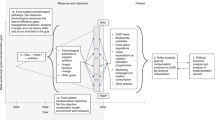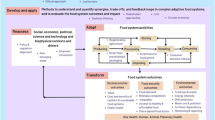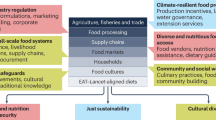Abstract
As the necessity of transitioning to food systems that are healthy and environmentally sustainable grows increasingly urgent, food systems seem to be locked into delivering negative outcomes. One driver of this lock-in is that some of the changes from transitioning food systems would result in asset stranding for firms and financial institutions. In this Perspective we provide examples of where asset stranding can occur in food systems and offer solutions for navigating the political economy of these stranded assets. By proactively attending to the stranded assets problem, it may be possible to break out of financial lock-in in food systems.
This is a preview of subscription content, access via your institution
Access options
Access Nature and 54 other Nature Portfolio journals
Get Nature+, our best-value online-access subscription
$32.99 / 30 days
cancel any time
Subscribe to this journal
Receive 12 digital issues and online access to articles
$119.00 per year
only $9.92 per issue
Buy this article
- Purchase on SpringerLink
- Instant access to full article PDF
Prices may be subject to local taxes which are calculated during checkout

Similar content being viewed by others
References
Conti, C., Zanello, G. & Hall, A. Why are agri-food systems resistant to new directions of change? A systematic review. Glob. Food Secur. 31, 100576 (2021).
Seto, K. C. et al. Carbon lock-in: types, causes, and policy implications. Annu. Rev. Environ. Resour. 41, 425–452 (2016).
Caldecott, B., Howarth, N. & McSharry, P. Stranded Assets in Agriculture: Protecting Value from Environment-Related Risks (University of Oxford, 2013); https://ora.ox.ac.uk/objects/uuid:4496ac03-5132-4a64-aa54-7695bfc7be9d
Semieniuk, G. et al. Stranded fossil-fuel assets translate to major losses for investors in advanced economies. Nat. Clim. Change 12, 532–538 (2022).
Daumas, L. Financial stability, stranded assets and the low-carbon transition – a critical review of the theoretical and applied literatures. J. Econ. Surv. 38, 601–716 (2024).
Blesh, J. et al. Against the odds: network and institutional pathways enabling agricultural diversification. One Earth 6, 479–491 (2023).
Whitton, J. & Carmichael, A. Systemic barriers preventing farmer engagement in the agricultural climate transition: a qualitative study. Sustain. Sci. https://doi.org/10.1007/s11625-024-01504-7 (2024).
Mehrabi, Z., Gill, M., Wijk, M., van, Herrero, M. & Ramankutty, N. Livestock policy for sustainable development. Nat. Food 1, 160–165 (2020).
Herzon, I. et al. Both downsizing and improvements to livestock systems are needed to stay within planetary boundaries. Nat. Food 5, 642–645 (2024).
Hansen, T. A. Stranded assets and reduced profits: analyzing the economic underpinnings of the fossil fuel industry’s resistance to climate stabilization. Renew. Sustain. Energy Rev. 158, 112144 (2022).
Caldecott, B., Clark, A., Koskelo, K., Mulholland, E. & Hickey, C. Stranded assets: environmental drivers, societal challenges, and supervisory responses. Annu. Rev. Environ. Resour. 46, 417–447 (2021).
Schumpeter, J. A. Capitalism, Socialism and Democracy (Harper & Brothers, 1942).
Vallone, S. & Lambin, E. F. Public policies and vested interests preserve the animal farming status quo at the expense of animal product analogs. One Earth 6, 1213–1226 (2023).
Morris, V. & Jacquet, J. The animal agriculture industry, US universities, and the obstruction of climate understanding and policy. Climatic Change 177, 41 (2024).
Sievert, K., Lawrence, M., Parker, C. & Baker, P. Understanding the political challenge of red and processed meat reduction for healthy and sustainable food systems: a narrative review of the literature. Int. J. Health Policy Manag. 10, 793–808 (2021).
Savage, S., Fray, K., Hancock, A. & Pooler, M. The global power of Big Agriculture’s lobbying. Financial Times (22 August 2024).
Bertram, C. et al. Carbon lock-in through capital stock inertia associated with weak near-term climate policies. Technol. Forecast. Soc. Change 90, 62–72 (2015).
Sovacool, B. K. & Scarpaci, J. Energy justice and the contested petroleum politics of stranded assets: policy insights from the Yasuní-ITT Initiative in Ecuador. Energy Policy 95, 158–171 (2016).
Vogt-Schilb, A. & Hallegatte, S. Climate policies and nationally determined contributions: reconciling the needed ambition with the political economy. WIREs Energy Environ. 6, e256 (2017).
Walton, S., Hawkes, C. & Fanzo, J. Searching for the essential: exploring practitioners’ views on actions for re-orienting food systems towards healthy diets. Glob. Food Secur. 37, 100687 (2023).
Caleffi, S., Hawkes, C. & Walton, S. 45 Actions to Orient Food Systems towards Environmental Sustainability: Co-Benefits and Trade-Offs (City University of London, 2023).
Jones, S. K. et al. Agrobiodiversity Index scores show agrobiodiversity is underutilized in national food systems. Nat. Food 2, 712–723 (2021).
Pingali, P. in Agricultural Development in Asia and Africa: Essays in Honor of Keijiro Otsuka (eds Estudillo, J. P. et al.) 21–32 (Springer Nature, 2023).
Walton, S. Transforming the food system in ‘unprotected space’: the case of diverse grain networks in England. Agric. Hum. Values https://doi.org/10.1007/s10460-023-10535-2 (2024).
Magrini, M.-B., Béfort, N. & Nieddu, M. in Agroecosystem Diversity (eds Lemaire, G. et al.) 375–388 (Academic, 2019).
Stone, T. F. et al. Food system strategies to increase grain legume-cereal intercropping in Europe. Agroecol. Sustain. Food Syst. 49, 518–542 (2024).
Wood, B. et al. What is the purpose of ultra-processed food? An exploratory analysis of the financialisation of ultra-processed food corporations and implications for public health. Glob. Health 19, 85 (2023).
Money, A. & Johnes, M. Corporate Venturing in Alternative Proteins: A Database of Transactions (Smith School for Enterprise and the Environment & University of Oxford, 2023).
Monteiro, C. A. Nutrition and health. The issue is not food, nor nutrients, so much as processing. Publ. Health Nutr. 12, 729–731 (2009).
Gilmore, A. B. et al. Defining and conceptualising the commercial determinants of health. Lancet 401, 1194–1213 (2023).
Fooks, G. J., Williams, S., Box, G. & Sacks, G. Corporations’ use and misuse of evidence to influence health policy: a case study of sugar-sweetened beverage taxation. Glob. Health 15, 56 (2019).
Food & Beverage Sector Guidance (TPT, 2024); https://www.ifrs.org/content/dam/ifrs/knowledge-hub/resources/tpt/food-beverage-sector-guidance-apr-2024.pdf
Frontini, P. Brazil’s Marfrig sells abattoirs to Minerva in $1.5 bln deal. Reuters (29 August 2023).
Mielnik, S. & Richardson, J. Marfrig to Minerva Asset Sale: Decoding the Wood from the Trees (Anthropocene Fixed Income Institute, 2023); https://anthropocenefii.org/nature-loss/marfrig-to-minerva-asset-sale-decoding-the-wood-from-the-trees
A Rotten Business: How Barclays Became the Go-to Bank for JBS, One of the World’s Most Destructive Meat Corporations (Feedback, Mighty Earth & BankTrack, 2023); https://mightyearth.org/wp-content/uploads/Feedback-JBS-Apr23-Proof05.pdf
Bull in the Climate Shop: Industrial Livestock Financing Sabotages Major U.S. Banks’ Climate Commitments (Friends of the Earth, 2024); https://foe.org/resources/bull-in-the-climate-shop/
Bhat, S., Mann, W. & Murray, A. Financing Mechanisms to Accelerate Managed Coal Power Phaseout (RMI, 2023); https://rmi.org/wp-content/uploads/dlm_uploads/2023/01/financing_mechanisms_accelerate_managed_coal_power_phaseout.pdf
Holzman, L. & Kekki, E. Managed Coal Phaseout: Metrics and Targets for Financial Institutions (RMI, 2023); https://rmi.org/wp-content/uploads/dlm_uploads/2023/01/managed_coal_phaseout_metrics_and_targets_financial_institutions.pdf
The Managed Phaseout of High-Emitting Assets (GFANZ, 2022); https://assets.bbhub.io/company/sites/63/2022/06/GFANZ_-Managed-Phaseout-of-High-emitting-Assets_June2022.pdf
Financing the Managed Phaseout of Coal Fired Power Plants in Asia Pacific (GFANZ, 2023); https://assets.bbhub.io/company/sites/63/2023/05/gfanz_consultation_managed-phaseout-of-coal-in-Asia-Pacific.pdf
Ausserladscheider, V. Towards a sociology of stranded assets. J. Cult. Econ. 17, 141–146 (2024).
Chaudhary, N. From Stranded Assets to Assets-at-Risk: Reframing the Narrative for European Private Financial Institutions (I4CE, 2024); https://www.i4ce.org/en/publication/stranded-assets-assets-risk-reframing-narrative-european-private-financial-institutions-climate/
Ambikapathi, R. et al. Global food systems transitions have enabled affordable diets but had less favourable outcomes for nutrition, environmental health, inclusion and equity. Nat. Food 3, 764–779 (2022).
Leonard, C. The Meat Racket: The Secret Takeover of America’s Food Business (Simon and Schuster, 2014).
Trebilcock, M. J. Dealing with Losers: The Political Economy of Policy Transitions (Oxford Univ. Press, 2015).
Pell, D. et al. Support for, and perceived effectiveness of, the UK soft drinks industry levy among UK adults: cross-sectional analysis of the International Food Policy Study. BMJ Open 9, e026698 (2019).
Pedroza-Tobias, A., Crosbie, E., Mialon, M., Carriedo, A. & Schmidt, L. A. Food and beverage industry interference in science and policy: efforts to block soda tax implementation in Mexico and prevent international diffusion. BMJ Glob. Health 6, e005662 (2021).
Ruggeri Laderchi, C. et al. The Economics of the Food System Transformation (Food Systems Economics Commission, 2024).
Future Fit Food and Agriculture: The Financial Implications of Mitigating Agriculture and Land Use Change Emissions for Businesses (FOLU, 2024); https://www.foodandlandusecoalition.org/wp-content/uploads/2024/03/FOLU-Future-Fit-paper-2_compressed.pdf
Meat, Beef & Poultry Processing in the US - Market Research Report (2015-2030) (IBISWorld 2025); https://www.ibisworld.com/united-states/industry/meat-beef-poultry-processing/251/#Companies
Annual Report 2023/24 (Danish Crown, 2024); https://www.danishcrown.com/media/2ejp1jhv/2023-2024-annual-report-en.pdf
Author information
Authors and Affiliations
Contributions
S.W., J.F. and Z.M. conceptualized the Perspective. S.W. wrote the original draft. Z.M., J.F. and B.C. provided feedback and edits. All authors contributed to revising the final version of the Perspective.
Corresponding author
Ethics declarations
Competing interests
The authors declare no competing interests.
Peer review
Peer review information
Nature Food thanks Hongbo Duan and the other, anonymous, reviewer(s) for their contribution to the peer review of this work.
Additional information
Publisher’s note Springer Nature remains neutral with regard to jurisdictional claims in published maps and institutional affiliations.
Rights and permissions
Springer Nature or its licensor (e.g. a society or other partner) holds exclusive rights to this article under a publishing agreement with the author(s) or other rightsholder(s); author self-archiving of the accepted manuscript version of this article is solely governed by the terms of such publishing agreement and applicable law.
About this article
Cite this article
Walton, S., Mehrabi, Z., Fanzo, J. et al. Asset stranding could open new pathways to food systems transformation. Nat Food 6, 440–445 (2025). https://doi.org/10.1038/s43016-025-01170-7
Received:
Accepted:
Published:
Issue date:
DOI: https://doi.org/10.1038/s43016-025-01170-7



